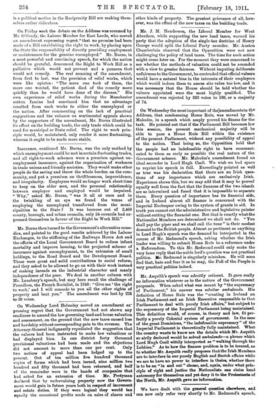On Wednesday Lord Helmsley moved an amendment ex - pressing regret
that the Government had not shown any readiness to amend the law governing land and house valuation and assessment, on the ground that the new taxes caused loss and hardship without corresponding gain to the revenue. The Attorney-General indignantly repudiated the suggestion that the valuers had been instructed to make low valuations or had displayed bias. In one district forty thousand provisional valuations had been made and the objections did not amount to more than one per cent. Only two notices of appeal had been lodged up to the present. Ont of ten million five hundred thousand c)pies of forms which had been issued, nine million two hundred and fifty thousand had been returned, and half of the remainder were in the hands of companies that had asked for an extension of time. Mr. Pretyman declared that by undervaluing property now the Govern- ment would gain in future years both in respect of increment and estate duties. If they were logical they would tax equally the occasional profits made on sales of shares and
other kinds of property. The greatest grievance of all, how- ever, was the effect of the new taxes on the building trade.






































 Previous page
Previous page